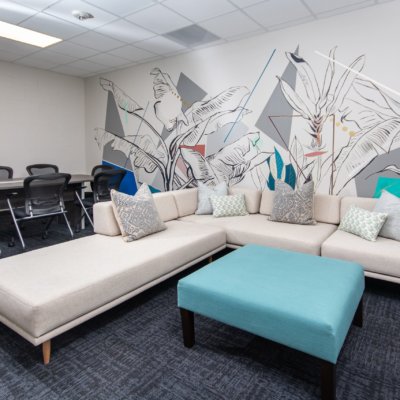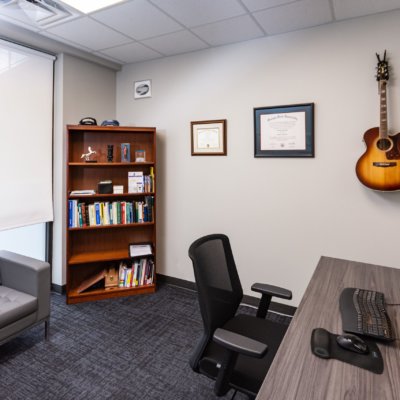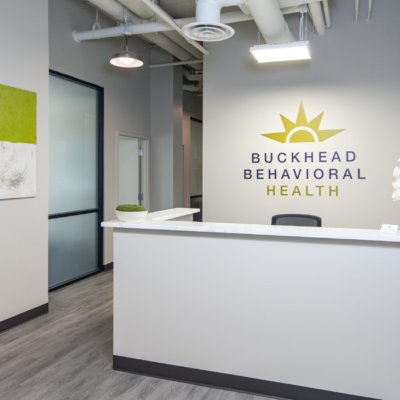At Buckhead Behavioral Health, the staff at our Partial Hospitalization Program (PHP) in Atlanta, Georgia has a combined 60 years of experience treating individuals struggling with substance use disorder, mental health disorders, and dual diagnosis disorders.
A partial hospitalization program, also known as a day treatment program, is the most intensive form of outpatient addiction treatment. Those in a PHP receive treatment during the day but do not have to stay at the facility overnight. Instead, patients live and sleep at home or in a sober living house in Atlanta, GA. Though this type of programming is outpatient, PHPs still include a high level of structure and support. Patients attend treatment 3 to 5 days a week and spend the majority of the day participating in support groups and therapeutic modalities.
Our Partial Hospitalization Program is Most Appropriate For:
- Someone who may need Medication-Assisted Treatment but does not need medically-managed detox.
- Someone who is stepping down from a residential rehab program or those who have a strong support system in place already
- Someone who is emotionally and physically stable enough to be present in groups
- Someone who needs intensive treatment for substance use disorders but does not require 24-hour supervision.
- Those who need ongoing support and counseling to help heal emotionally, mentally, and physically
- Those who need education in ways to avoid future substance abuse, including coping mechanisms for cravings and drug-use triggers.
Our Partial Hospitalization Program is our most popular level of care, allowing individuals to create a successful foundation of skills and tools needed to build on for long-term recovery.
A Typical Day in Our Partial Hospitalization Program
Our PHP program occurs from Monday to Saturday. A typical day can change in terms of topics and group discussions. However, our daily schedule is as follows:
9:00 AM to 9:30 AM: Each morning, clients check in to the program. At this time, they will take a breathalyzer test and have their vitals checked. They may also have a brief therapy session before the sessions begin. Overall, the morning check-in allows clients to set their intentions for the day, socialize with their peers, and get ready for their sessions.
9:30 AM to 11:00 AM: After check-in, clients attend a process group, which is more like traditional group therapy. This allows clients to bring up any issues and work through them as a group with the guidance of a therapist. The therapist leading the group will encourage clients to share and then the group discussion can occur organically.
11:00 AM to 12:30 PM: Clients then have a psychoeducational group. These are more like a lecture-style group—like going to a class in school. Topics include the disease model of addiction, coping with uncomfortable emotions, relationships, grief & loss, family, and communication.
12:30 PM to 1:30 PM: The PHP program breaks for an hour-long lunch. Lunch breaks provide an opportunity for clients to get to know one another.
1:30 PM to 3:30 PM: The last session of the PHP program alternates between cognitive-behavioral therapy (CBT) groups and dialectical behavior therapy (DBT) groups.
- On Monday, Wednesday, and Friday, clients attend a CBT group. During CBT groups, clients work on unhealthy thought patterns, core beliefs, cognitive restructuring, and creating positive affirmations. The group therapist will also help clients work through their thoughts and beliefs using the downward arrow technique.
- The DBT group occurs every Tuesday, Thursday, and Saturday afternoon of our PHP program. In DBT, clients go through a skills workbook focused on the four modules of DBT: (1) mindfulness, (2) distress tolerance, (3) emotion regulation, and (4) interpersonal effectiveness.
Throughout PHP, clients will also have a one-on-one therapy session for an hour each week. Clients in our PHP are also required to attend 3 to 5 support group meetings outside of the program. Many of our clients attend groups at the nearby Atlanta Triangle Club.
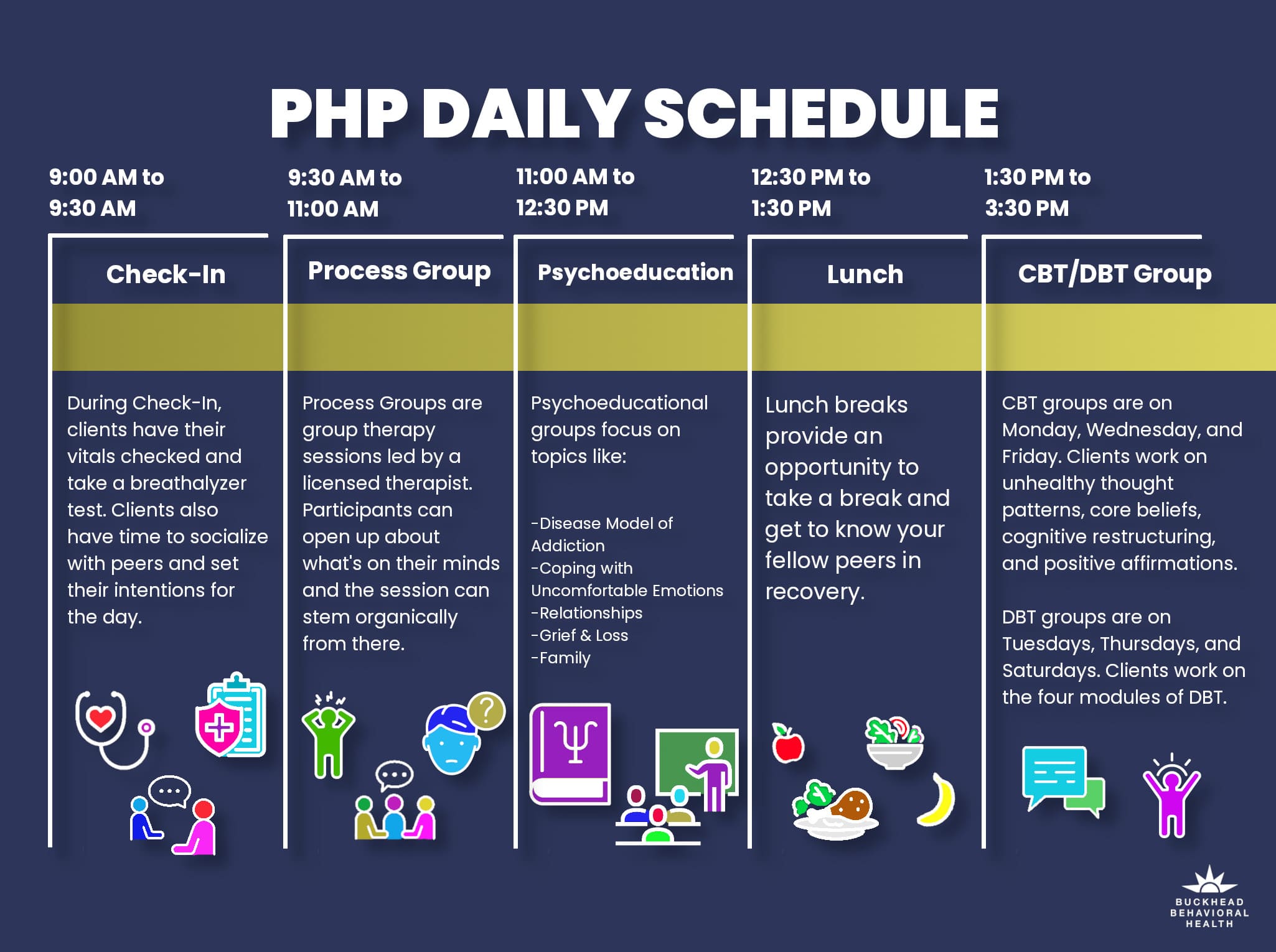
Our Partial Hospitalization Program (PHP) Includes
- Daily group sessions from 9:30 AM to 3:30 PM Monday through Saturday
- Weekly individual therapy sessions
- Weekly case management sessions
- Weekly medication management
- Family sessions depending on each person’s case
- Avoiding triggers
- Understanding addiction
- Medical Evaluations
- Psychological Evaluations
- Drug and alcohol screening and breathalyzing
- Holistic therapy and groups
- Relapse planning, goal setting, and daily check-ins
- Experiential therapy
- Job skill + resume building
- Financial education
Our Partial Hospitalization Program Therapies
A partial hospitalization program uses a wide array of addiction treatments in order to ensure that each individual gets the care they need. Depending on your needs, your treatment may involve one or more of the following programs:
Individual Therapy
Individual therapy involves one-on-one sessions with a therapist or counselor. There are many different kinds of individual therapy. The one most commonly utilized in addiction treatment is cognitive-behavioral therapy or CBT. This type of therapy focuses on helping people to recognize the situations, behaviors and emotions that trigger their drug use. Individual therapy also provides the tools to help avoid or cope with these things.
Group Therapy
Group therapy, whether part of a 12-step program or not, is a great asset in addiction treatment. Being in a group of people who have similar experiences with addiction and recovery helps patients feel less alone. It also helps boost confidence in their ability to succeed. It also gives them a place to talk about their personal experiences and struggles in a non-judgmental, supportive space.
Family Therapy
If your addiction has had an impact on your family, our PHP offers family therapy as part of our programming. Family therapy helps to heal the damage your addiction may have caused. It also strengthens the family bond and helps create a strong support network for your recovery.
Medication-Assisted Treatment (MAT)
Most often offered to those with an alcohol or opioid addiction, MAT programs use medications to treat the symptoms of withdrawal, as well as substance cravings. MAT is very effective in helping alcohol or opioid abusers to both stop using, and avoid using again in the future.
Want to Learn more about Buckhead Behavioral Health?
Partial Hospitalization vs Inpatient Treatment
While partial hospitalization may be confused with inpatient treatment, there is a stark difference between the two. Inpatient treatment requires that you live onsite at a facility where you received your treatment services which may include individual therapy, holistic therapy, and more. Typically, inpatient treatment lasts between 30 and 60 days.
In addition, those who attend inpatient treatment may relocate to a new geographical area to remove themselves from their current situation.
On the other hand, a Partial Hospitalization Program offers a structured treatment environment during the day and allows you to either return to your home or a sober living environment during the evening.
At Buckhead Behavioral Health, our Partial Hospitalization Program in Atlanta gives you the freedom to return home at night while still receiving lifesaving therapeutic services during the day.
Are Partial Hospitalization Programs Effective?
Despite being outpatient programs, partial hospitalization programs are still a very effective way to help treat drug or alcohol addiction. They provide the same levels of care as an inpatient program, but with the added benefit of patients still being able to reside at home.
There are some instances, however, in which PHPs may not be a good option. If you do not have stable housing, have an unsupportive family, or other substance users in the home, a PHP may not be for you. This is also true for people with very severe addictions, who may have life-threatening withdrawal symptoms, or for people who have already completed an addiction treatment program at least once.
Does Insurance Cover PHP Programs?
Buckhead Behavioral Health works with a variety of insurance providers to assure our programs are as accessible as possible. Whether or not our partial hospitalization program is covered by insurance depends on your carrier and specific insurance plan. It is important to note that though outpatient programming is typically cheaper than inpatient treatment, any form of addiction treatment is an investment. Thankfully, this investment is associated with immeasurable rewards as establishing and maintaining sobriety is priceless. To learn more about the insurance plans we accept or to discuss alternative payment options, please reach out to our admissions team. We will be happy to provide you with further information while answering any questions you might have.
What Happens After Our Partial Hospitalization Program in Georgia?
Typically, partial hospitalization programs are only one step in a person’s continuum of care. When an individual transitions out of a PHP, they often begin intensive outpatient programming (IOP) or standard outpatient drug rehab programming (OP). Those in an IOP receive a similar amount of support, however, they attend treatment less frequently and have more flexibility in their treatment schedules. OPs are the least intensive form of outpatient programming and often focus on integrating patients back into the real world or into a sober living environment. Those who do not participate in additional outpatient programming after completing a PHP still have access to aftercare services and alumni resources. Aftercare services include 12-step support groups, drug testing, and continued check-ins. Alumni resources can help with job placement and relapse prevention.
Begin Our Partial Hospitalization Program in Atlanta Today
Get the help you need to overcome addiction and find lasting recovery. At Buckhead Behavioral Health in Atlanta, GA, our PHP will provide you with the treatment you deserve. If you’re currently dealing with an addiction and would like to know more about partial hospitalization programs, contact us today. We can help you to decide if a PHP is right for you. Our team will design a treatment program that will maximize your chances of success.
We understand that seeking help can be difficult, and will be right beside you every step of the way. Your life can be more fulfilling than you ever imagine. All you have to do is make the first step towards recovery and call Buckhead Behavioral Health or visit our admissions page to get started.
Helpful Resources
- Does Drug Rehab Work?
- Can I Get Short-Term Disability for Mental Health?
- What Is Trauma-Informed Addiction Treatment?
- FMLA for Rehab in Atlanta, GA
- LGBTQIA+ Counseling & Rehab in Atlanta, GA



